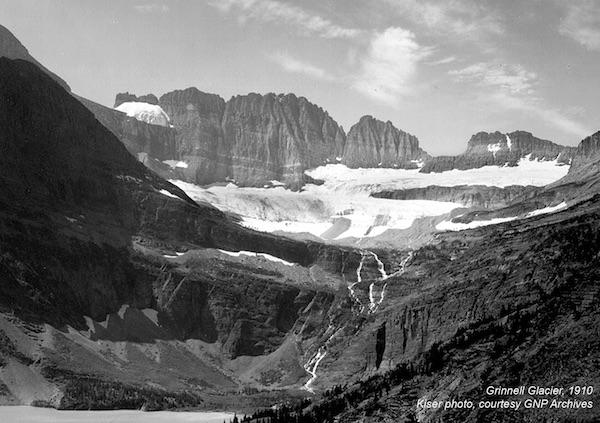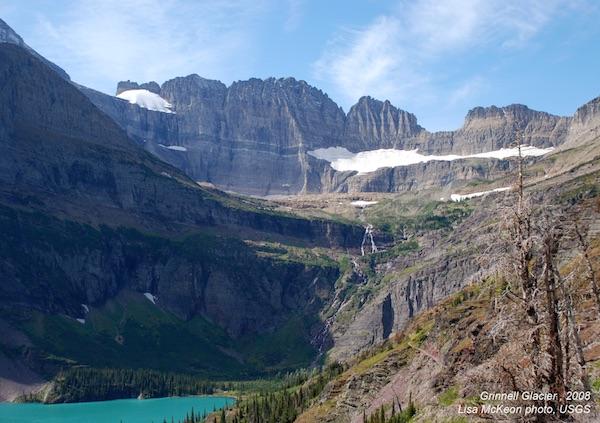
Grinnell Glacier in 1910/Fred Kiser photo, courtesy of Glacier National Park Archives
With the possibility that Glacier National Park will be glacierless by as soon as 2020, are you moving up your plans to visit the park?
That seems a reasonable question, both in light of recent weather patterns, warming temperatures, and the ability to glimpse a glacier upclose without traveling to Alaska. Not too many years ago scientists were predicting that Glacier's glaciers would be meltwater by 2030. But now they're moving the date up, to around 2020, due to the heightened pace of warming.
According to a story that ran on National Geographic's website in September 2013, "Since 1900, the mean annual temperature in Glacier National Park has increased by 2.4 degrees Fahrenheit (1.3 degrees Celsius)'1.8 times the global mean increase. Snowmelt is occurring up to a month earlier, and more precipitation is falling as rain rather than snow." And while one year does not make a trend make, snowfall this winter is running behind in Glacier, as is the snow water equivalent in that snowpack.
So, with the possibility that the park's glaciers will vanish in another five years, are you thinking of moving up your trip to Glacier?

Grinnell Glacier in 2008./Lisa McKeon photo, USGS

 Support Essential Coverage of Essential Places
Support Essential Coverage of Essential Places







Comments
By the way, Al, I have indeed ridden across from Seattle to Chicago on the Empire Builder. It was lovely, and a great way to travel. We even made a non-scheduled stop at midnight at Glacier NP to turn a fool over to the rangers after he drunkenly punched out a conductor. Being an icy mid-December, it looked mighty chilly in those handcuffs. I highly recommend the train ride.
re: "continuing to innovate and advance." Certainly no doubt those of us who comment on this site are very fortunate compared to most of the people on the earth, and even many who live in the U. S.
That said, we have a long way to go as a country by some measures. A chart of life expectancy by nation ranks the U. S. as # 37, behind virtually every Europen nation and even countries like Chile and Slovenia.
U. S. Rank in infant mortality is #26 out of 29 counties on a list of developed nations, and behind places like Poland, Czeck Republic, Korea, Spain and ...Slovakia.
Factors in those and overall death rates? According to this site, "Air pollution has now become the biggest environmental cause of premature death, overtaking poor sanitation and a lack of clean drinking water. In most OECD countries, the death toll from heart and lung diseases caused by air pollution is much higher than the one from traffic accidents."
Yes, "innovate and advance" can help solve this problem. A good place to start would be dramatically reducing use of coal to produce electricity, and therefore reduce health impacts from that energy source. How? "Innovations" such as solar and wind energy, or even (gasp) efforts to reduce energy use. Why don't we "innovate and advance in this area?
Lots of factors, but perhaps the biggest hurdle - such steps might cost us a few more dollars on our electric bill - and would certainly cut into profits for energy companies.
Just one example of many.
JT - excellent. It's pretty clear that we "Debbie Downers" are actually optimistic realists who believe that although the world's resources are indeed finite, we can survive and live well -- if we learn to innovate and advance within the limits imposed upon us by our finite earth. We may be starting to do that as we seek alternative energy sources and continue trying to better our stewardship of what the planet offers us.
Whether or not man has "constantly improved his well being and will continue to do so in the future" is certainly open to debate. That is what we need to do, but are we succeeding? Time will tell.
As for living longer and enjoying the best standard of living ever -- even that is open to question as JT so ably pointed out.
In the meantime, the invitation is still open. Ec, you have not told us anything specific. Here's your chance to drop the vapid generalizations and attack lines and tell us exactly HOW you believe we have improved our world and exactly what we will need to do to meet future challenges so that we may continue to live long and well.
All of us are consumers of what Earth offers. How do you propose that we be wise consumers whose consumption and waste products don't harm us and others?
If you truly have a vision, then share it. We might all learn something.
A good place to start might be to actually prove your claim that the world is somehow not finite. If you can do that, you will have completely revolutionized the laws of nature.
Remembering Blackfoot Glacier set me to thinking of other memories of that time long ago when another theory of earthly dynamics was being hotly debated.
It was something called "Plate Tectonics" and it had the scientific community sharply divided. To some old school geologists the idea that continents and ocean floors could actually slide around on the planet's surface was ludicrous. The battle raged in much the same way as our current arguments about anthrpomorphic climate change.
But as tools such as Glomar Challenger and the cores samples it drilled from the floor of the Atlantic Ocean began to provide solid evidence to support the theory, the scientific world began to offer more and more support -- even though some of it was certainly grudgingly given. Finally, when enough evidence had been collected, opposition to the theory faded to nothing and Plate Tectonics took its place as established fact.
Right now, all we have to either support or disprove anthropomorphic climate effects is tentative evidence. No one really can say for certainty just how it will all finally shake out. The problem, however, is that while human survival didn't rest upon Plate Tectonics, climate change might be different.
Some of us fear that by the time the science is settled on the question, we may have reached a tipping point -- a point of no return. It would be horrible if some of those old science fiction movies portraying a post-apocolyptic earth came true.
Shouldn't we, the intelligent apes who inhabit the planet at this point in time, at least try to address the possibility that the theory now being addressed might be valid?
Then, on the other hand, since none of us will be here to have to endure that uncertain future, why should we care? Why not just continue to enjoy what we think is The Good and Prosperous Life and damn the future inhabitants of Spaceship Earth?
Blackfoot Glacier is gone. Middle Teton Glacier is going. Neither of them are really consequential in the long run. But my great-great-great grandchildren might be.
I haven't gotten very far into Diane Ackerman's book, but what I've read so far tells me that this is not, as Dr. Runte alluded, just a book pointing out THE PROBLEM. Instead, she spends much of her writing telling us of hopeful -- but in America -- unheard of innovative solutions from other places in the world.
As ec said above, man is capable of innovating. But for some reason we in America seem to be falling farther and farther behind the rest of the world. Ackerman tells us of innovative projects in such places as the Thames River, Nederlands, Norway, Bangladesh and other places around the globe. But her stories of American innovation are sparsely populated.
Yet on page 64 she does share the story of an aquafarm in Long Island Sound that is the work of a young man from Newfoundland named Bren Smith. He he is working with something he calls "vertical farming" underwater. One of his crops is kelp. As we read, we learn that "Kelp is over 50 percent sugar. The Department of Energy did a study that showed if you took an area half the size of Maine and just grew kelp, you could produce enough biofuel to replace oil in the U.S. That's stunning. And without the negatives of growing land-based biofuel . . . It wastes a lot of water, fertilizer, and energy. But here you can have a closed-energy farm, using zero fresh water, zero fertilizer, and zero air [and also absorbing huge amount of carbon from the atmosphere] while providing fuel for local communities. I grow this kelp for food, but you could plant it in the Bronx River or in front of sewage treatment plants which would reduce their polluting. Or you could grow kelp for biofuel."
Yet we are not even exploring this seriously in America. Why not?
Could it be political? Could it be economic pressure from corporations that stand to lose profits from oil or coal extraction? Ackerman doesn't address those questions, but those of us who are paying attention already know the answers. That pretty well explains why even Bangladesh is ahead of the United States in efforts to create a sustainable system of agriculture and life for its people.
Is our American myopia driven by profitgreed?
What could happen if we, as a nation, were to launch an effort similar to that of placing a man on the moon to find solutions to our energy and climate challenges?
Good post, Lee.
re: "What could happen if we, as a nation, were to launch an effort similar to that of placing a man on the moon to find solutions to our energy and climate challenges?"
I believe we could make significant progress...but perhaps the biggest hurdle is getting anything approaching consensus that we even have any challenges/issues in terms of energy and climate. As long as significant numbers of Americans (including those with political and financial clout) don't feel there is a problem, there won't be any will to proceed.
A comfortable life-style and financial self-interest are powerful disincentives for change in the status quo.
In the broadest sense the universe is infinite and there is little doubt we will be expaning into the universe and exploiting its resources. Closer to home what today seems "finite" is likely to be expanded in the future. Take oil for example. Original peak oil production was predicted to be hit in the 1970s. Innovations that improved drilling exploration and development have us producing more oil than ever before. Similarly there were predictions that we wouldn't be able grow enought food to feed the world's population. Again innovations in farming techniques have proved that fear unfounded. That was the context of my comment. That the Debbie Downers don't see the potential to expand through innovation. They see the issue as how to divide the pie rather than on how to grow it for the betterment of everyone.
Ilrelevant in relation to my comment. I was talking about life expectancy over time. There is no doubt that virtually worldwide, life expectancy has risen dramatically over time.
BTW - Did you notice that those WHO numbers were made up and not actual reported numbers? You anti-fossil fuel types sure have a liking for made up numbers.
While I am sceptical of their conclusions even they attribute it to cars not coal and note that it is countries like China and India that are the primary source. Yes, China and India should clean their air.
Already told you - increased life expectancy, better health, higher standard of living for the vast majority of the worlds population.